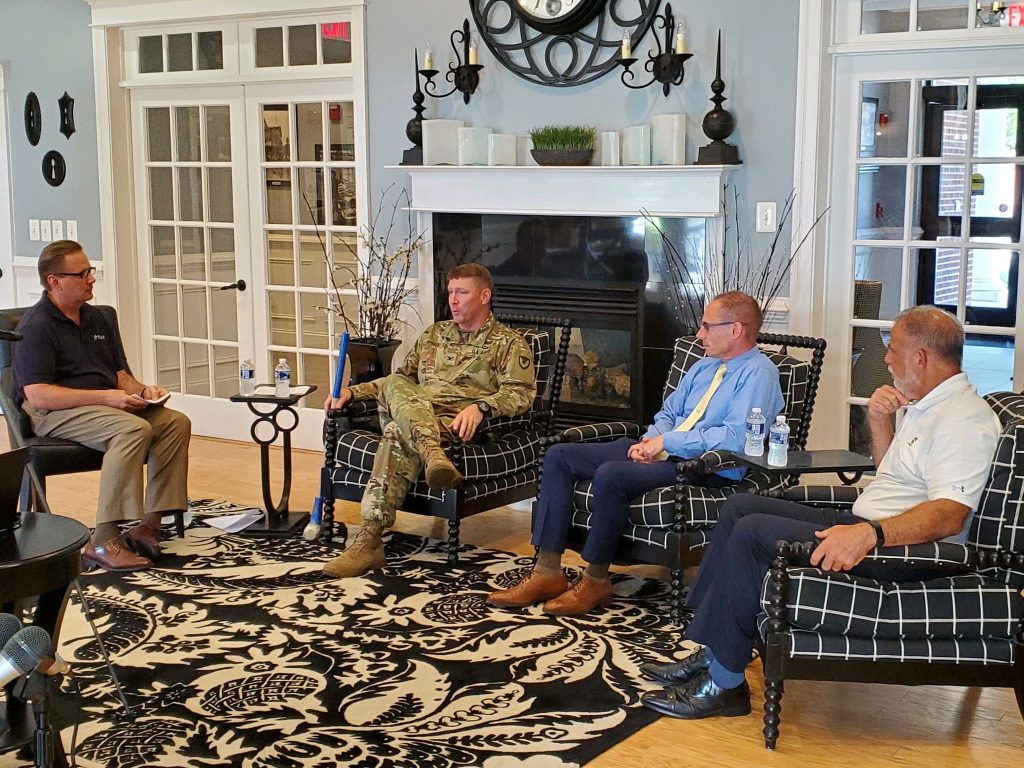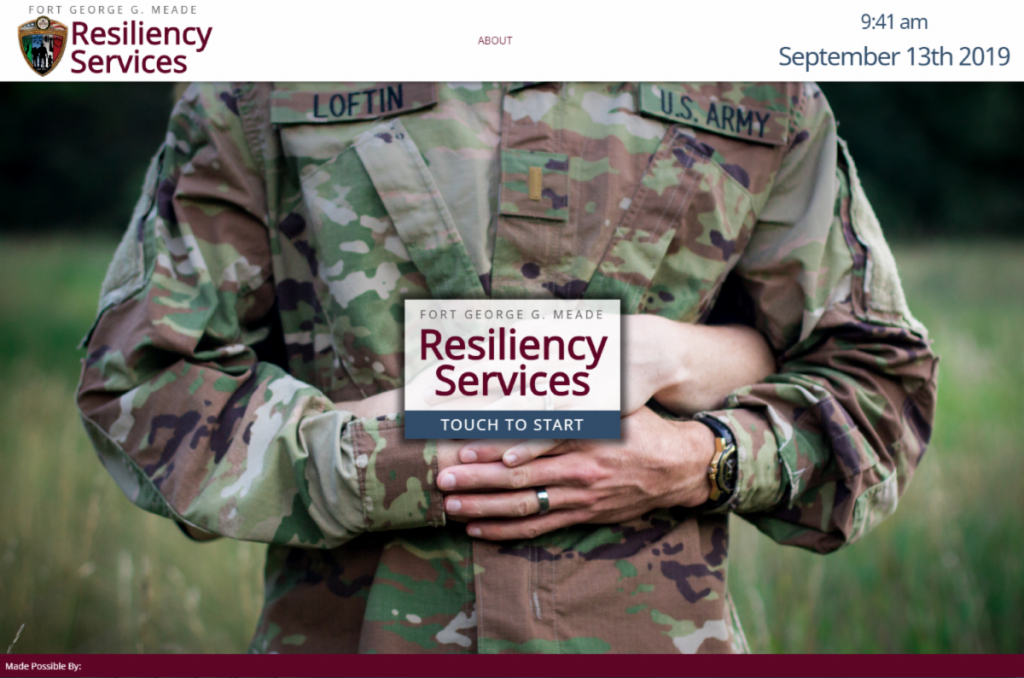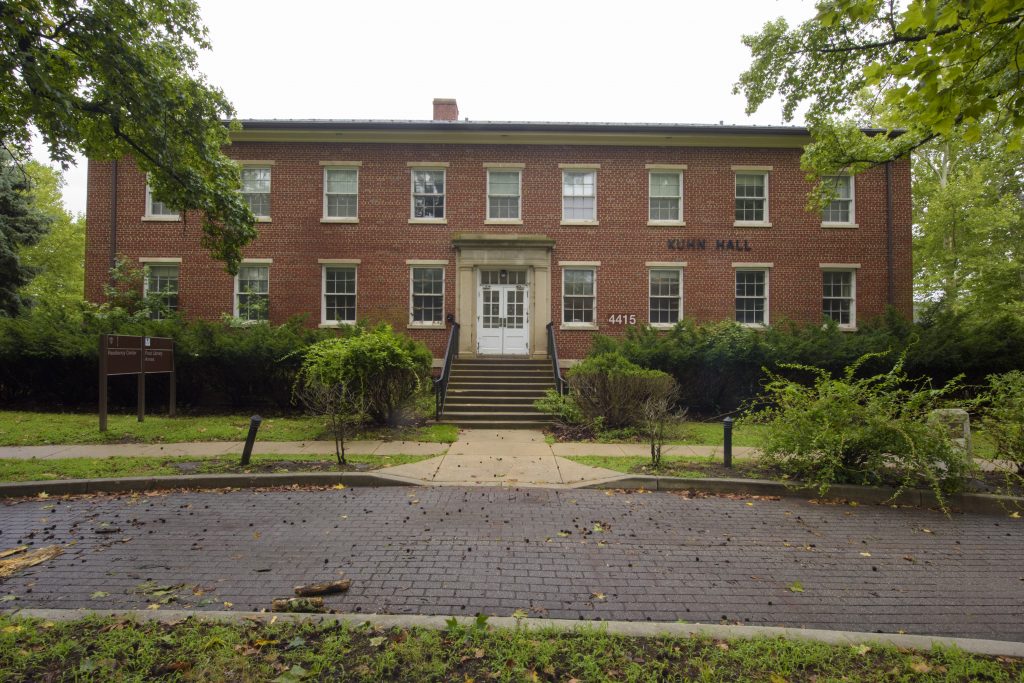July 20, 2020 – It took nine years of planning, a $3.6 million capital campaign, multiple redesigns, meticulous processing of an 800-item requirements list and exhaustive collaboration with five garrison commanders, numerous on-post agencies and innumerable community members, but the transformation of Fort George G. Meade’s historic Kuhn Hall into a modern Education and Resiliency Center began last week with a flurry of sledge hammers.
The Fort Meade Alliance and Fort Meade Alliance Foundation hosted the ceremonial wall breaking online after the U.S. Army officially accepted the organizations’ gift proffer to renovate the building.
“It’s been a long journey since the idea and need first came to light in 2011,” said Deon Viergutz, FMA Foundation President. “The partnership and fortitude of the Garrison, the Fort Meade Alliance, the FMA Foundation and the community could not have been stronger as we’ve progressed through requirements, design, fundraising and now approval to begin construction.”
At a roundtable discussion following the wall breaking, Garrison Commander Col. Erich Spragg and two former commanders, Retired Col. Brian Foley and Retired Col. Ed Rothstein, discussed the resiliency challenges that face service members, military families and civilian personnel on post.
“It’s impossible to overstate the importance of the mission that goes on here,” Foley said. “We are at war in cyberspace and it is a war that goes on 24 hours a day, seven days a week. It’s the people who live and work here who are on the frontlines… The people here may not be getting fired at with kinetic bullets or mortar rounds, but the stresses involved in the non-stop grind of defending our nation still wear on you.”

Due to the classified nature of their work, those warfighters can’t discuss their work with family or friends. Service members and civilians at Fort Meade shoulder similar requirements and operate without a personal support network as they deploy overseas alone or in small teams.
“So people internalize the stresses and, unfortunately, some people will go to unhealthy habits to decompress,” Col. Spragg said. “We see that manifested in domestic violence, we see that manifested in child abuse, in increased alcohol use and substance abuse, suicidal ideation and suicide itself. We have to figure out a healthy way for people to decompress. The services that Kuhn Hall will provide gives that to our service members and their families.”
Often reluctant to recognize or address behavioral health issues while they are still in uniform, many veterans struggle with issues long after their service ends, Rothstein said. “Veterans are still committing suicide at incredible rates, anywhere from 20 to 22 a day. We’re never going to stop that, but we have to do our best to minimize it.”
The new Fort Meade Education and Resiliency Center will be designed to “support soldiers at all stages of their careers, from junior enlisted to veterans” as well as families and DoD civilians, Viergutz said. Designed around the concept of an education and resiliency campus, the center will provide onsite classes, counselling and events, but also serve as a hub to connect individuals with services elsewhere on post, within the military and out through surrounding communities.
In addition to the newly renovated building, a kiosk linking to an online system has also been created to provide access to these services. Multiple kiosks will be located throughout the Installation providing a brief description of the services, contact information and a QR code that users can scan for direct access on their mobile devices.
The renovated building is designed to be warm, inviting and highly flexible “so that spaces can be used as classrooms during the day and, in the evenings, host resiliency activities, small-group counselling sessions or even turn into a yoga studio. The space will also be able to change as the needs of the installation change,” said Lisa Decker, Chair of the FMA’s Military and Family Committee.

Doris Tyler, former director of Army Community Service at Fort Meade, said the center “will create a lot of space for family services and programs,” from professional education courses for military spouses to nights in the commercial kitchen, learning about how to prepare healthy meals on a budget.
Retired Col. Beverly Maliner, who worked on the center’s planning for years, called the project “a very audacious idea. In the Army, it is very difficult to do a project that has to be sustained over such a long period of time because the population and commanders are rotating so often. To sustain this kind of project, you have to have a champion that keeps it going through transitions of leadership.”
“If there was one constant in this project, it was the Fort Meade Alliance,” said Cmdr. Marivic Fields, former director of Behavioral Health at Fort Meade. “The Fort Meade Alliance was really good at making sure it stayed on the table at all times and through five garrison commanders and kept this project moving forward.”
Under the terms of the proffer, the FMA Foundation will temporarily take over responsibility for Kuhn Hall for the duration of the construction project. The 9,000-square-foot renovation is expected to take nine to 12 months.
“The persistence it took to shepherd this project all the way up through the Secretary of the Army’s office will be worth every bit of the effort,” Col. Spragg said.
The new Education and Resiliency Center will focus on education and the five pillars of resiliency: physical, emotional, social, family and spiritual. The services will range from guidance counseling and transition efforts to mental health counseling, wellness programs and financial planning. A premier benefit of this space will be new programming for educational programs needed for successful career placement and continuing education, and expansion of existing programs to broader audiences, including spouses.
“The goal of this Center is to provide the fullest range of resiliency and education services to positively impact the lives of the military and civilian personnel who work and live on Fort Meade,” said Doreen Harwood, president of the Fort Meade Alliance. “And while it will be a physical building, our goal is that each person who walks through the front door feels they are cared for and supported as a full member of our community.”
“This project has already been recognized as an example of how much can be accomplished when a military installation partners with community groups,” said Col. Spragg. “The Fort Meade Alliance has proven their dedication to the men and women of Fort Meade time and again, and I’m proud to have played a small role in bringing this worthy effort to its final stage.”
